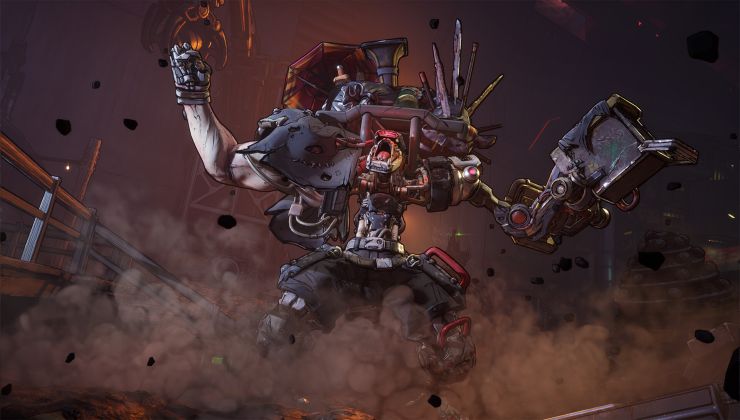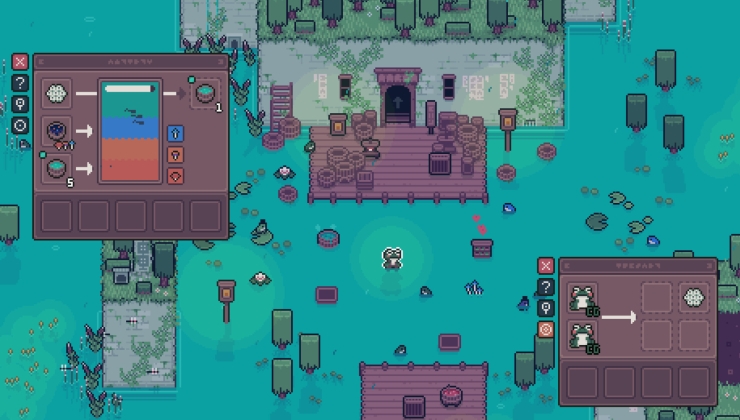OneXPlayer are a series of handheld gaming devices, they're somewhat popular and it appears they've been keeping a close eye on SteamOS and how it's been working on the Steam Deck.
Currently they offer various models like the OneXPlayer Mini, OneXPlayer 1S, two AMD models and the One-GX 1 Laptop. However, all of them currently ship with Windows. Some of them are pretty powerful too, like the currently sold-out "ONEXPLAYER AMD® - 8.4 inch Ryzen® 5700U" model. Their prices are quite a bit higher than Steam Deck too, with that model in particular retailing at $1,419.
The good news is that they might actually be shipping SteamOS Linux in future, bringing them more in line with what the Steam Deck can do. As WePC recently did an interview with the VP of OneXPlayer, Jason Zeng. Here's the excerpt:
Zeng continued to share his opinions on Valve’s market-disrupting machine by giving his stance on how Valve managed to achieve success with the device. ‘Steam Deck is a very influential product that has managed to leverage its accumulated assets and bring [the] public’s attention to the field of portable gaming. We sincerely congratulate Steam Deck for its achievements, and will keep working on our competitive edges.’
[…]
Of particular note is how the Proton developers actually improved performance in games such as Elden Ring, which highlights the OS against running something a little harder on the system like Windows 11. Zeng comments that the team has been ‘working on’ shipping the OneXPlayer line of devices with a build of Linux or SteamOS in the future.
Having more devices out there shipping Linux sound awesome. However, they seem to have no plans for cheaper devices right now, so you might want to keep waiting on and sticking with the Steam Deck if you don't have a ton of spare cash stuffed under your bed.
Not all of them: the GPD boss went on a public rant about how the Deck was terrible because it couldn't run pirated games. I think he was feeling rather threatened by it.I'm quite sure i can run pirated games on Linux, so why i couldn't on the deck?
also competing with phones/tablets
I would never seriously play games on a phone. I much prefer having separate devices that are good at doing their own thing. i.e. phone for communication (SIP, XMPP, Matrix, E-mail,...), gaming console for games, something else with a good DAC for music, eBook for reading, desktop for srsbns. etc. All running GNU+Linux of some variant of course.
what is this device offering that is so important, that a small laptop cannot? What is the use case?It's the built-in gamepads/buttons/sticks and the form factor. Also, perhaps a different mindset when it comes to expectations for the device. It's designed to play games first and foremost, everything else it does is just a bonus.
I'm looking more for the equivalent of chromebooks for this form factor than for the equivalents of Alienware.You probably want something single board computer (SBC) based like a Raspberry Pi retro gaming device. RP4 can run Ubuntu MATE fine but I'm not sure what kind of games it could play because it's aarch64 / arm64 rather than x86_64.
reviews: https://retrododo.com/best-retro-handhelds/
DIY book: https://www.pishop.us/product/retro-gaming-with-raspberry-pi/
OS: https://www.lakka.tv/
Otherwise, perhaps some Intel or AMD based 2-in-1 that runs GNU+Linux. [Garuda Linux KDE Dra460ized Gaming Edition](https://garudalinux.org) is an Arch based distro, like SteamOS is, that ships with a bunch of game related software.
There are plenty of controllers that can expand one way or another to hold a tablet. I wish the [Madcatz L.Y.N.X. 9](https://www.gameskinny.com/vksxz/mad-catz-unveils-lynx-9-a-transforming-controller) still existed. Maybe if we send them enough e-mails. lol.
Oh, and https://itch.io/ has plenty of Linux, Android, HTML, and web based games available. Many are from small indie devs and don't require the horsepower of an army. They're also less expensive and the site has great deals/bundles regularly.
I'd be wary but, if Steam is running in a sandboxed flatpak that only has permissions to read certain directories then it should be fine because the Steam client should not be able to read the separate directory that has questionable game files. Or, simply multiboot.Not all of them: the GPD boss went on a public rant about how the Deck was terrible because it couldn't run pirated games. I think he was feeling rather threatened by it.I'm quite sure i can run pirated games on Linux, so why i couldn't on the deck?
These "questionable game files" could simply be backups, purchased elsewhere, or bought by somebody else that the device is shared with. :) Or, these days, even cached data from some archive or streaming service...
addendum:
I wonder what the possibility & potential of all these small game ODMs getting together to form a co-op organization to increase their buying power with OEMs. Like, if they had one buying account they pooled their money into but negotiated to still have at least slightly different components.
In niches like this, I think cooperation rather than cut-throat annihilation would be the best for everyone. And, I certainly don't mean buy-outs and mergers because that often leaves the consumer in the dust. Competition and innovation are good. Choices are good and I'd rather not see any company fail that doesn't deserve it for being, in short, "evil".
Last edited by EWG on 15 Jul 2022 at 7:08 pm UTC
Yeah, I hate playing games on my phone. Honestly if my phone was a simple browser / email / phone / text thing, I'd probably be happier with it, and the battery would likely last a lot longer throughout the day. There are occasions when I need something else, but then many times I end up just pulling out a laptop or tablet so I can actually read stuff in non-mobile internet mode... Maybe I'm just getting older and crankier and don't need all the extra crap that just gets in my way :Palso competing with phones/tablets
I would never seriously play games on a phone. I much prefer having separate devices that are good at doing their own thing. i.e. phone for communication (SIP, XMPP, Matrix, E-mail,...), gaming console for games, something else with a good DAC for music, eBook for reading, desktop for srsbns. etc. All running GNU+Linux of some variant of course.
what is this device offering that is so important, that a small laptop cannot? What is the use case?It's the built-in gamepads/buttons/sticks and the form factor. Also, perhaps a different mindset when it comes to expectations for the device. It's designed to play games first and foremost, everything else it does is just a bonus.
I'm looking more for the equivalent of chromebooks for this form factor than for the equivalents of Alienware.You probably want something single board computer (SBC) based like a Raspberry Pi retro gaming device. RP4 can run Ubuntu MATE fine but I'm not sure what kind of games it could play because it's aarch64 / arm64 rather than x86_64.
reviews: https://retrododo.com/best-retro-handhelds/
DIY book: https://www.pishop.us/product/retro-gaming-with-raspberry-pi/
OS: https://www.lakka.tv/
Otherwise, perhaps some Intel or AMD based 2-in-1 that runs GNU+Linux. [Garuda Linux KDE Dra460ized Gaming Edition](https://garudalinux.org) is an Arch based distro, like SteamOS is, that ships with a bunch of game related software.
There are plenty of controllers that can expand one way or another to hold a tablet. I wish the [Madcatz L.Y.N.X. 9](https://www.gameskinny.com/vksxz/mad-catz-unveils-lynx-9-a-transforming-controller) still existed. Maybe if we send them enough e-mails. lol.
Oh, and https://itch.io/ has plenty of Linux, Android, HTML, and web based games available. Many are from small indie devs and don't require the horsepower of an army. They're also less expensive and the site has great deals/bundles regularly.
I'd be wary but, if Steam is running in a sandboxed flatpak that only has permissions to read certain directories then it should be fine because the Steam client should not be able to read the separate directory that has questionable game files. Or, simply multiboot.Not all of them: the GPD boss went on a public rant about how the Deck was terrible because it couldn't run pirated games. I think he was feeling rather threatened by it.I'm quite sure i can run pirated games on Linux, so why i couldn't on the deck?
These "questionable game files" could simply be backups, purchased elsewhere, or bought by somebody else that the device is shared with. :) Or, these days, even cached data from some archive or streaming service...
addendum:
I wonder what the possibility & potential of all these small game ODMs getting together to form a co-op organization to increase their buying power with OEMs. Like, if they had one buying account they pooled their money into but negotiated to still have at least slightly different components.
In niches like this, I think cooperation rather than cut-throat annihilation would be the best for everyone. And, I certainly don't mean buy-outs and mergers because that often leaves the consumer in the dust. Competition and innovation are good. Choices are good and I'd rather not see any company fail that doesn't deserve it for being, in short, "evil".






 How to set, change and reset your SteamOS / Steam Deck desktop sudo password
How to set, change and reset your SteamOS / Steam Deck desktop sudo password How to set up Decky Loader on Steam Deck / SteamOS for easy plugins
How to set up Decky Loader on Steam Deck / SteamOS for easy plugins
See more from me